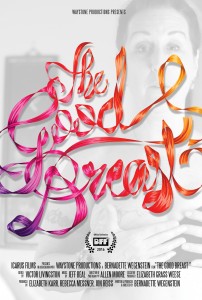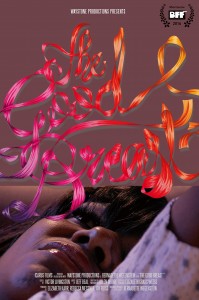The Good Breast takes viewers behind the scenes of America’s cultural obsession with breast cancer, one that is fueled by hype and the perpetual promise of cure.
![]()


QUOTES ABOUT THE GOOD BREAST
“The Good Breast takes viewers behind the scenes of America’s cultural obsession with breast cancer, one that is fueled by hype and the perpetual promise of cure. We meet real people, patients and physicians alike, as they confront tough decisions about how best to deal with a potentially life-threatening disease and its impact on their lives.”
— Gayle Sulik, Author of Pink Ribbon Blues: How Breast Cancer Culture Undermines Women’s Health
“In her powerful documentary, Bernadette Wegenstein explores bodily, emotional, erotic, and psychic scars of the loss of the breast for breast cancer patients, their families, and communities. It skillfully juxtaposes medical, scientific and religious myths regarding mastectomy in order to offer a brilliant diagnosis of personal and cultural imaginaries of female bodies. If the good breast is, as Melanie Klein writes, the prototype of the everything that is good, then what are the implications of such enormous loss, especially if this loss is not culturally recognized? And how can we mourn such a loss? A remarkable work of great interests to feminist scholars, students, and activists.”
— Ewa Plonowska Ziarek
Julian Park Professor of Comparative Literature, Author of Feminist Aesthetics and the Politics of Modernism
“Presenting the voices of women with breast cancer, their doctors, and their families, The Good Breast, poignantly recounts the myriad different ways in which women equate femininity and their bodies with their sense of self.”
— Sujata Moorti
Director and Professor of Gender, Sexuality, and Feminist Studies
Middlebury College
“The Good Breast takes an unflinching look at the experiences of women
learning to live with a breast cancer diagnosis. The filmmakers had
extraordinary access to the women, their families, and the doctors that
treated them. TGB was shot with great sensitivity, but never “sugar coats.”
The disease’s effects go far beyond the physical body. It effects social,
psychological and spiritual dimensions of life. Patients battle cancer on
each dimension. For some the breast cancer journey leads to tragedy; for
others it leads to triumph. But for all who view this film it will lead to
enlightenment.”
— Thomas A. LaVeist, PhD
Chair and Professor Department of Health Policy and Management
Milken Institute School of Public Health, George Washington University
“This is a rare insight into the rising rates of contra-lateral mastectomies in the US. The film gives an insight into these reasons which are normally hard to classify.”
— Robert A. Aronowitz, M. D.
Department Chair — University of Pennsylvania, Department of History and Sociology of Science
“I really liked how one did not know where the stories were going just like in real medical practice. I cannot remember breast cancer documentaries where women switch doctors and have procedures that fail. Plus men leaving. Plus women believing in miracles and watching how their skeptical doctors deal with this. To the degree that one can document these, The Good Breast is much more real than others. Schnaper keeps our attention because you do not know what she will say. Of course, her passion and commitment to her patients shines through.”
— Barron Lerner, M. D., Professor of Medicine and Population Health – Division of Medical Ethics, New York University
“The Good Breast is essential viewing for anyone who has had breast cancer, who knows someone with breast cancer, or who has lost someone to breast cancer. No other film that I know of has reached so deeply into the lives of the women struggling with this disease, and shown their fight with such honesty, empathy, and love.”
— Marc Shmuger, Former Universal Pictures Chairman, Current Head of EuropaCorp
“Just as the breast gives us all life, The Good Breast gives us hope — by showing us the painful struggles and astonishing strength of women afflicted by breast cancer, and those who cherish and fight with them. “
— Stephen Nemeth, Independent Producer, C.O.G, Fuel, Flow: For Love of Water, The Sessions
“Raw courageous look at breast cancer.”
— Alexis O. Korycinski, Filmmaker